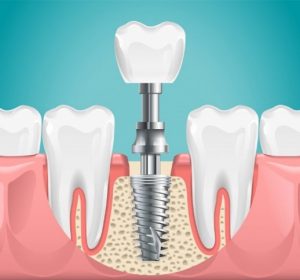
If you have dental implants, then you’re probably pretty satisfied with what they’ve done for your smile. After all, they’re the premier option for replacing missing teeth, as they’re able to fully restore them in terms of look, feel, and functionality. But despite their capabilities, dental implants can still sometimes fail—and when this happens, your oral health is in jeopardy! Here’s more about what causes dental implants to fail and how your dentist in Greenfield can address the issue.
What Causes Dental Implants to Fail?
There are many different things that can cause dental implant failure. However, most failures can be categorized into two types based on when they occur:
- Early failures – An “early failure” is one that occurs within the first few months of the implant being placed. It’s usually due to the implant still being loose, which can stem from a variety of factors including movement during the healing process, lack of stability, an oral infection, or simply the overall healing ability of the patient.
- Late failures – “Late failures” occur one year or more after the implant surgery, and they’re usually a little more complicated. Sometimes an implant is placed without any problems but begins to lose stability over time due to things like excess pressure, infection, or physical trauma. Other times, the implant remains sturdy, but X-rays reveal signs of perio-implantitis, which is an advanced infection that can destroy bone matter around the base of the implant.
How Are Failing Dental Implants Addressed?
In most cases, failed implants are addressed by being removed and then replaced—although this is often much easier said than done! Salvaging a failed implant is often difficult and depends on the situation, making removal the simpler option. That said, it’s still worth noting that some implants are more difficult to remove than others.
For example, since early failures occur relatively soon after the implant is placed, they’re usually easy to address as the implant is often loose enough to be extracted and replaced without real issue. However, implants in the lower jaw are usually firmer and a little tougher to remove. Additionally, implants that have been there for over 24 months might also be tricky to remove.
If your dentist has determined that your implant has failed and needs to be addressed, there are a few main approaches they can use. One common method involves them making a small, conservative incision in the bone along the edge of the failed implant. This releases much of the present tension, making the implant easier to remove!
Another method that’s become more common involves your dentist using a special set of tools that utilizes reverse torque to take out the implant. This might sound a little odd and difficult to picture, but it’s completely safe for the patient, and also conveniently eliminates the need for your dentist to remove any bone matter. In any case, no matter how the failed implant is extracted, it will need to be replaced. This can sometimes happen immediately after the implant’s out, but sometimes a dental bone graft is required to create a healthier site for the future implant.
If you suspect that one of your dental implants is failing, help is available! Talk with your dentist to see what your options are for removing the implant and getting your smile back on track.
About the Practice
The team at Advanced Dental Treatment Center is honored to serve the dental needs of the Greenfield, WI area under the leadership of Dr. William Carini and Dr. Kristen Farr. Their practice is proud to offer a wide range of available services including dental implants. If you suspect that your dental implant is failing, don’t hesitate to reach out online or over the phone for assistance: (414) 209-7463.

